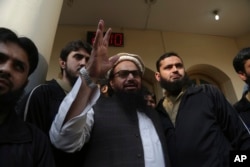Pakistan has amended its anti-terrorism law that authorizes the government to blacklist charities linked to Islamist leader Hafiz Saeed.
Two charities run by Saeed — Jamaat-ud-Dawa (JuD) and the Falah-e-Insaniat Foundation (FIF) — have been outlawed by the U.N. Security Council for being "terrorist fronts" for Lashkar-e-Taiba, a group Saeed founded 30 years ago that has been blamed for the 2008 deadly attacks in India's financial capital of Mumbai.
Pakistani President Mamnoon Hussain last week quietly approved the amendments to the law, which the government only made public Monday.
Until now, the organizations sanctioned by the U.N. Security Council were not automatically listed as terrorist entities in Pakistan, enabling JuD and FIF to conduct their charity-related activities around the country and collect donations.
Islamabad's move comes a week before the Financial Action Task Force (FATF) on terror financing holds a crucial meeting in Paris to assess Pakistan's efforts to choke funding sources to terrorist groups, including those linked to Saeed.
Washington has offered a $10 million reward for bringing Saeed to justice and warned Islamabad of repercussions in November after a Pakistani court freed the cleric from months of house arrest, citing a lack of evidence linking him to the Mumbai attacks.
Saeed has repeatedly denied involvement in the violence and alleges his house arrest was the outcome of U.S. pressure on Pakistan.
The amended anti-terrorism law that was made public would also enable authorities to list two other charities in the country — Al-Akhtar Trust and Al-Rashid Trust — that the U.N. has designated terrorist groups because of their links to al-Qaida.
India has long demanded Pakistan try and punish Saeed for planning the 2008 bloodshed. Islamabad maintains New Delhi has not provided enough evidence to arrest and successfully prosecute the cleric.
Indian authorities allege organizations linked to Saeed are fueling a separatist insurgency in the India-rule portion of the divided Kashmir region.
Bilateral tensions have been running high between the two nuclear-armed rival nations.
Following the latest deadly militant attack against an army base in the disputed region over the weekend, Indian Defense Minister Nirmala Sitharaman warned Monday that Pakistan "will have to pay for the misadventure."
Islamabad rejected India's allegations of Pakistani involvement in the attack. In a statement, the Foreign Ministry urged New Delhi to "refrain from any misadventure" across the de facto Kashmir border.





